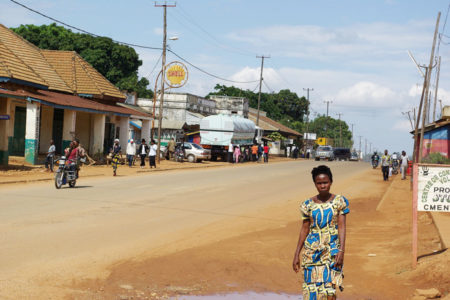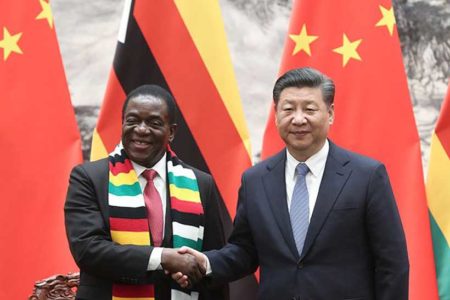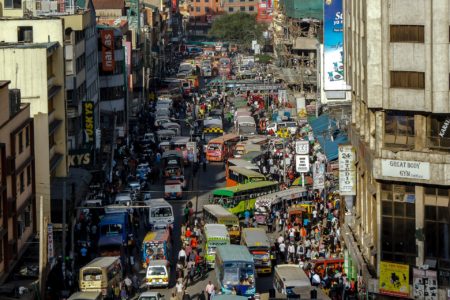
Photo: Archbishop Sebastian Shaw. Source: UK Foreign & Commonwealth Office
On September 26, 2019, Nigerian soldiers liberated more than 300 men and boys — some as young as five years old — from what could be called a prison masquerading as an Islamic school in the city of Kaduna in northwestern Nigeria.
“Most of the freed captives seen by a Reuters reporter in the city of Kaduna were children, aged up to their late teens. Some shuffled with their ankles manacled and others were chained by their legs to large metal wheels to prevent escape…”
“Reports carried by local media said the captives had been tortured, starved and sexually abused…”
“One young man, Hassan Yusuf, said he had been sent to the school because of concerns about his way of life following a few years studying abroad.”
“‘They said my lifestyle has changed – I’ve become a Christian, I’ve left the Islamic way of life,’ said Yusuf…”
The “school” — the Imam Ahmad Bun Hambal Centre for Islamic studies — “was able to operate undetected in Kaduna city for years.”
Faced with the horrors that were uncovered at the facility, some family members of the captive males insisted that they had believed it was a genuine school for teaching the tenets of Islam and the rules of proper behavior.
The raid that rescued the men and boys again brought to the fore the issue of the “Almajiri“ Islamic education system in northern Nigeria, which was “started in the 11th century”, and is estimated to have an estimated 7 million to 9.5 million students today. These schools “lack good teachers and a fairly healthy environment. The standards are very low…” Children in Almajiri schools are sometimes considered by the government to be “out-of-school children,” and they “are often sent to beg on the streets.”
Referring to these schools, Nigerian President Muhammadu Buhari, himself a Muslim, said:
“The issues of health and education are constitutional. If there are too many almajiris in a state, then the government is not following the constitution.”
The state government in Kaduna, where the men and boys had been held, “says it will now carry out checks on all Koranic schools across the state. According to the BBC:
“This is an eye-opener for us,” said Hafsat Baba, Kaduna State Commissioner of Human Services and Social Development. She added that if this scale of abuse was happening in the main city, she didn’t know what might be going on in rural areas.
“We have to map all the schools. And we have to make sure that if they violate the government orders then they have to be closed down completely”…
On October 12, Nigerian police rescued “nearly 70 men and boys from a second purported Islamic school where they were shackled and subjected to ‘inhuman and degrading treatments.'”
“The raid in Katsina, the northwestern home state of President Muhammadu Buhari, came less than a month after about 300 men and boys were freed from another supposed Islamic school in neighbouring Kaduna state where they were allegedly tortured and sexually abused…
“Lawal Ahmad, a 33-year-old who was held captive, said he witnessed sexual assault, beatings and the death of other captives during his two years there.”
The government investigations may reveal the existence of many additional prisons pretending to be legitimate Islamic schools.
Meanwhile, in Pakistan, the abduction of girls and young women for the purpose of forced conversion is commonplace. The victims of kidnappings are mainly Christian and Hindu. The Catholic Archbishop of Lahore, Sebastian Shaw, recently expressed alarm at the spike in abductions and forced conversions to Islam — and forced marriage to Muslims — of young Pakistani girls from these two religious minorities.
According to the Catholic organization, Aid to the Church in Need (ACN), “research in Pakistan indicates that up to 700 girls were kidnapped in one year alone.”
“[Archbishop Shaw] said that in response to the increase in abductions, Christian leaders took the problem to the police “but they were not listening” so they went straight to the government. ‘We raised it with the government and they took up the matter. Along with the Islamic council, they arranged a meeting with myself and leaders from the Muslim and Hindu communities. I participated in the meeting… One young Islamic scholar criticised the kidnappings and said forced conversions are not allowed.’
“Despite this, Archbishop Shaw was optimistic about the future of Pakistan, seeing the current government, headed by Prime Minister Imran Khan, as moving in the right direction. He said: ‘The present government are working on equality. All people should have a sense of belonging.'”
Nevertheless, according to the latest annual report of the United States Commission on International Religious Freedom (USCIRF):
In 2018, religious freedom conditions in Pakistan generally trended negative despite the Pakistani government taking some positive steps to promote religious freedom and combat religiously motivated violence and hate speech. During the year, extremist groups and societal actors continued to discriminate against and attack religious minorities, including Hindus, Christians, Sikhs, Ahmadis, and Shi’a Muslims. The government of Pakistan failed to adequately protect these groups, and it perpetrated systematic, ongoing, egregious religious freedom violations; this occurred despite some optimism about the potential for reform under the new government of Prime Minister Imran Khan.”
The findings above seem to indicate that not much has changed in Pakistan in the years since the murder in 2011 of the governor of the Punjab Province, Salman Taseer, presumably for his having condemned the country’s blasphemy laws and for his defense of Asia Bibi. Bibi, a Christian woman sentenced to death in 2010 for blasphemy, was finally released in October 2018.
Two months after Taseer’s murder, Pakistan’s Minister of Religious Minorities, Shahbaz Bhatti, a Christian, was assassinated after “urging reform to blasphemy laws.”
The abuses committed by radical Islamists against Muslims and non-Muslims alike is not merely a crime; it is a global threat. A first step towards eradicating this threat might be establishing an international interfaith coalition of Muslims, Christians and other religions, with chapters in every country, to stand up against religious persecution and on behalf of the right of every individual to harbor beliefs and engage in practices of his or her choosing.






Recent Comments